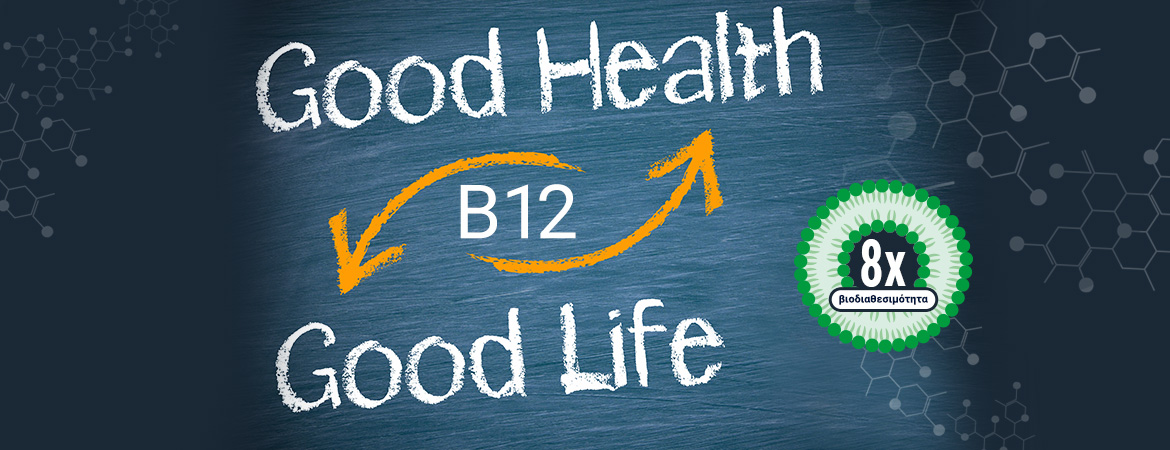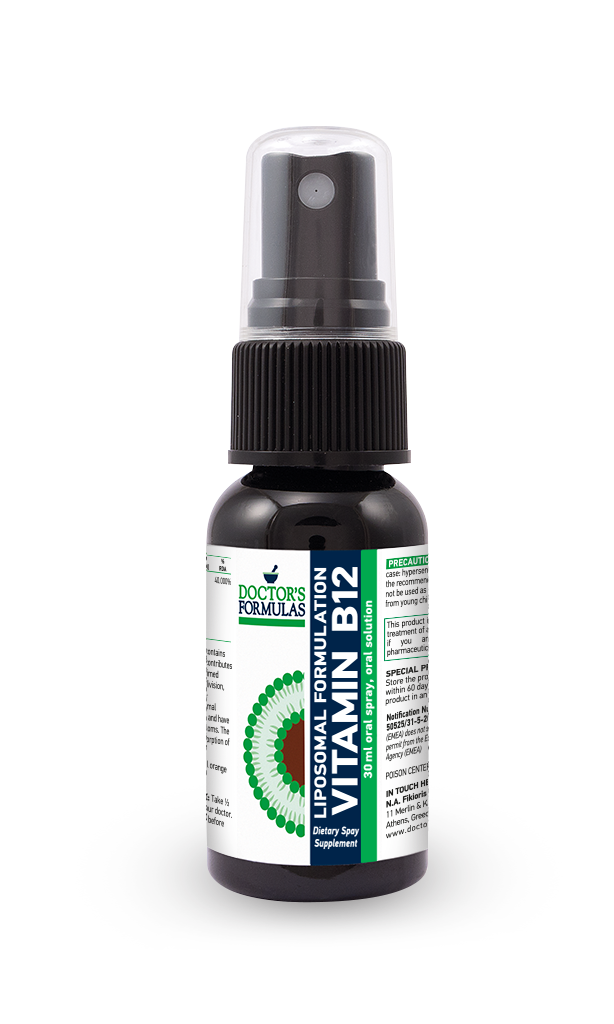Vitamin B12 & Pernicius Anemia
B12 Deficiency
Definition, Symptoms, Causes, Treatment
Vitamin B12 is an important nutrient for the health of the entire body.
Vitamin B12 is important for the normal formation of red blood cells and the health of the nerve tissues.
Its beneficial properties contribute to the health of the nervous and cardiovascular system, as well as to the prevention of anemia.
Vitamin B12 Definition
One of the most important nutrients we get from animal feed is vitamin B12. Indeed, it is the largest known biomolecule and the only carbon-metal stable carbon-bound nutrient.
A cobalt molecule is located at the center of each B12 molecule, which has the approximate chemical formula of C61-64H84-90N14O13-14PCo. Isolated B12 is a crystalline compound with a strong red color due to the presence of cobalt.
A doctor referring to B12 had said, "These reddish drops that delight in sad hearts and strengthen weak hearts."
Vitamin B12 works with folic acid in many body processes, including DNA synthesis, red blood cells and insulin sheath (the myelin sheath) that surrounds nerve cells and facilitates the transmission of signals to the nervous system.
The severe shortage manifests itself as a terrible anemia, which was fatal and fatal until the discovery of B12 in the liver. However, long before anemia, other neurological disorders may occur, more often neurological problems or psychological conditions.
(*) President Kennedy had said he would never be president without the B12.
How is B12 absorbed in the body?
The absorption of vitamin B12 is a complex process, subject to various problems, in many places. B12 derived from animal feed enters the stomach as part of animal proteins and must first be released from pepsin and hydrochloric acid.
Free B12 is then bound to the R protein, which is released from the salivary cells and the parietal cells (these are the same cells that release hydrochloric acid).
To be efficiently absorbed, B12 should be attached to a protein called endogenous factor (IF), which is also secreted into the stomach. This can not happen until the protein R complexes break down from the pancreatic enzymes in the small intestine.
B12 then binds to the endogenous agent to go through the intestine to the lower part of the small intestine, where the endogenous vitamin B12 complex is bind to cell receptors, in a process involving calcium;
Thus, any deficiencies of pepsin, hydrochloric acid, R-protein, pancreatic enzymes, endogenous factor, calcium receptors and cells can all lead to B12 deficiency through blocked absorption.
Once found in the bloodstream, proteins bind with B12 and transport it to the cells. Within the cells, the enzymes release B12 from the protein complex and convert it into the two forms of the coenzyme, methylcobalamin and adenosylcobalamin.
Deficiency of the required enzymes can prevent this conversion.
Because the absorption process is so complex and therefore subject to various side effects, many people - especially the elderly - may develop a shortage, although they may receive abundant B12 from their diet.
Fortunately, the body absorbs about 1-5% of free B12 by a passive diffusion process. Therefore, supplementing with the correct form of B12 and eating habits rich in B12 can successfully cure any deficiencies caused by degradation of protein digestion or deficiency of R proteins, lack of endogenous factor or pancreatic enzymes.
Body requirements for absorbing vitamin B12 from food
B12 is almost exclusively in animal feeds such as beef liver, meat, fish, shellfish, dairy products and eggs, but the original source of B12 in nature is bacteria, the only creatures that can make this vitamin.
In humans and animals, these bacteria produce B12 in the large intestine. However, a minimum will be absorbed from the entire bowel wall, so we need to take B12 from animal feed or supplements.
The production of B12 supplements involves fermentation processes similar to those used for penicillin and other antibiotics. Complementing with the co-enzyme that forms methylcobalamin and adenosylcobalamin (forms found in cells) can overcome B12 deficiency in cells, caused by the lack or dysfunction of conversion enzymes.
Shellfish (mussels, etc.) contain the highest levels of vitamin B12 because they remove large amounts of microorganisms that make up vitamin B12 from the sea.
Interestingly, while eggs contain B12, they also contain substances that prevent absorption, leaving only milk as a rich source of B12 for vegetarians. However, studies show that for B12 in milk, pasteurization deforms milk proteins that help in the absorption of B12. Furthermore, some studies suggest that fermenting yogurt from milk reduces levels of B12.
B12 is destroyed on the surface of roasted meat, but not inside. A five-minute boil is enough to lose 8% of B12 in the meat.
Until recently, vegetarians and vegans have argued that some herbal foods could provide B12, such as seaweed, soybean, spirulina, and even dirty vegetables that have been fertilized with manure. Proponents of vegetarianism have pointed out that residents of India do not appear to have signs of B12 deficiency despite the very low levels of animal feed in their diet. Today, however, we know that a source of B12 in the main vegetarian diet of the Indians was insects and their parts in stored grains and legumes.
However, as early as 1974, an American study found that 92% of vegans, 64% of the vegetarians who drank their dairy consumption, 47% of their vegetarians eating dairy and eggs, and and 20% of the semi-vegetarians, have blood levels of vitamin B12 below normal, ie below the low range that indicates the appearance of pernicious anemia.
Plant foods that are said to be sources of B12 contain essentially B12 derivatives (called buds) - and are essentially substances that block the intake of true B12 and increase the body's need for the nutrient.
An astonishing source of cobamids is bacterial overgrowth in the small intestine, in which B12 derivatives are produced. Using antibiotics or a diet high in refined carbohydrates can encourage the proliferation of bacterial overgrowth and lead to B12 deficiencies.
Another area of concern is multivitamin products! Viktor Herbert, an important researcher of B12, argues that many multivitamin products contain false and even hazardous proportions of B12 that may be formed when crystalline B12 interacts with other nutrients in multivitamin products such as vitamin C, iron and copper.
Vitamin B12 and Folic Acid
High levels of folic acid can accelerate neuropsychiatric complications in people with B12 deficiency. Indeed, it is prohibitive for parenteral treatment of malignant deficiency to be associated with co-administration of folic acid.
Because vegetarian folate intake tends to be high (from the extensive consumption of green vegetables and folic acid-enriched cereal products), vegetarians have an increased risk of neurological and psychological problems.
Best form of B12 for absorption
Liver is used from the body to B12 for many years. This is the reason why there is a delay in the appearance of the defieciency symptoms, which may confuse people that are at the beginning of a vegetarian diet or those who have absorption problems.
Interestingly, the body can recycle 75% of the B12 it uses. The viable form of B12 is secreted into the bile and then reabsorbed into the small intestine by the same complicated procedure as described previously.
Some people have a more efficient recycling system than others and therefore can spend longer with a vegetarian diet without any sign of inadequacy!
It is very important that stored vitamin B12 is more easily eliminated than excessive fiber intake, a common feature of vegan and vegan diet.
Anemia caused by B12 deficiency
Symptoms, Causes & Treatment
☤ Pernicius anemia mainly occurs when a person lacks the intrinsic agent and can not absorb B12. It is the most common cause of malignant anemia and is defined as an autoimmune reaction that attacks and destroys those cells of the stomach that produce the endogenous factor.
Pernicius anemia, also known as vitamin B12 deficiency, is defined by two factors that are detected during blood tests.
Immature, abnormally large red blood cells are fragile megaloblastic erythrocytes which are very inefficient for oxygen transport and white blood cells that are made up of abnormal nuclei.
Early symptoms of vitamin B12 deficiency include:
⇝ weakness, fatigue
⇝ pale skin, paleness
⇝ constipation or diarrhea
⇝ loss of appetite, weight loss
⇝ indigestion
⇝ fragile nails, dark circles
⇝ changes in behavior
While symptoms of severe anemia include:
⇝ dyspnoea
⇝ limb hallucinations
⇝ cramps
⇝ rapid heart beat
⇝ disorder of reflexes
⇝ muscle weakness
⇝ neuropathic pain
⇝ loss of vision
⇝ reduction of cognitive capacity
⇝ changes in memory
⇝ depression and confusion
In general, very high levels of B12 are required to cope with the lack of endogenous factor. Nowadays, doctors prescribe injections or oral supplements in even larger doses and treatment is lifelong.
B12 deficiency mimics many of the characteristics of aging, such as inertia and unsteady pace, muscle weakness, incontinence, slowing reactions, loss of memory, disorientation, depression and confusion.
In conclusion, by preventing B12 deficiencies we can delay aging!
Alzheimer's Disease & B12 deficiency
Researchers have estimated that a vitamin B12 deficiency can lead to reduced methylation reactions in the central nervous system, a hallmark of Alzheimer's disease, and to the possibility that genetic predisposition for Alzheimer's may be associated with a genetic damage to its ability to absorb B12.
More generally, it has been observed that B12 deficiency increases homocysteine levels. When homocysteine levels increase, then the ability of an organism to metabolize neurotransmitters decreases. This means that high levels of homocysteine predict the onset of dementia or Alzheimer's disease.
Research shows that vitamin B12 adequacy has the potential to greatly reduce neuropsychiatric disorders in elderly patients.
In one study, 61% of patients with mental dysfunction had complete recovery achieved with the administration of B12 dietary supplements. Researchers speculate that those who did not recover had suffered from a severe deficiency so that the damage to the nervous system had become irreversible.
Groups at risk for vitamin b12 deficiency
- Different problems in the digestive process
- Vegetarians and vegans
- Those receiving medication for gastric or peptic ulcers
- Those receiving metoformin
- Those who consume anticonvulsant drugs
✩
Doctor's Formulas is the only Greek company that uses the bioactive form of vitamin B12 (methylcobalamin), combined with the unique benefits of liposomal technology.
✓ Liposomal molding technology brings maximum absorption and 8 times greater bioavailability of active substances and vitamins.
➤ The Vitamin B12 Liposomal Formulation comes to change the data to those who have shortcomings in this valuable nutrient by raising B12 levels in a short time and safely.
Supplemental administration of Vitamin B12 offers:
✓ Energy & Resistance
✓ Protect & repair DNA
✓ Protection against cardiovascular disorders
✓ Protection from neuropsychiatric disorders


